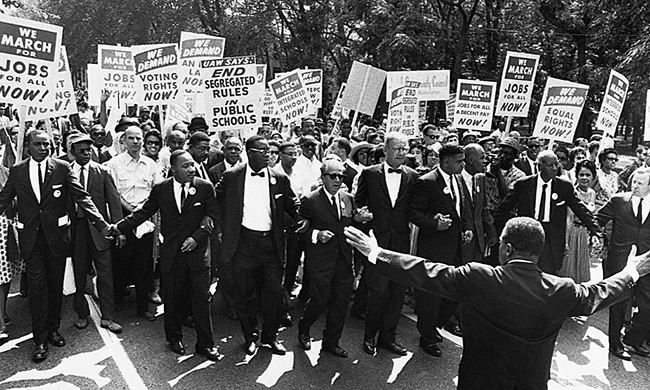The waning years of the 1800s bore an uncanny resemblance to the present. The U.S. economy was transforming and globalizing, leaving behind many hardworking people. Then, as now, a populist uprising was underway in national politics against politics as usual. Then, as now, tough-talking contenders tried to position themselves as spokesmen for the people.
That earlier populism shared many of the complaints about widespread economic stagnation and urban elites that animated voters in 2016. But, rather than in the apocalyptic preaching of a reality TV star, the movement's backbone lay in feats of economic self-help. And this made all the difference. The proposals those populists sought called for fuller democracy, not authoritarian retrenchment.
This was a populism of hope, not a populism of fear.
Lawrence Goodwyn's classic history of the late 19th century "agrarian revolt in America," The Populist Moment, recounts a fearsome political awakening among farmers of the South and West, White and Black, and their revolt against the financial power of urban robber barons.
Goodwyn became convinced that "the agrarian revolt cannot be understood outside the framework of the cooperative crusade that was its source." His history traces an outline for a better kind of populism.
The populist movement culminated with the 1896 election. The populists' People's Party reluctantly endorsed the Democratic candidate, William Jennings Bryan, who narrowly lost to William McKinley, and the party imploded. But those populists' legacy remains with us. A flexible money supply, a progressive income tax, a national farm-credit system, secret ballots--these are (albeit incomplete) outgrowths of their demands. After Colorado elected a People's Party governor in 1892, it became one of the first states to embrace women's suffrage.
At work behind almost any great social movement, but rarely noticed in the headlines or the popular mythology, is an engine of counter-economy. It is a source of inspiration and a means of material support. Gandhi regarded homegrown enterprise--memorialized in the spinning wheel on India's flag--as the core of his independence strategy; the more visible confrontations with British colonizers were a secondary outgrowth. African Americans mobilizing for rights in the 1950s and '60s depended not just on the pooled resources of Black churches, but also on the land and economic freedom they gained through the Federation of Southern Cooperatives. The language of Black Power was born during Stokely Carmichael's stay on Black-owned co-op land in Georgia.
"Insurgent movements are not the product of 'hard times,'" Goodwyn wrote. "They are the product of insurgent cultures."
The roots of the populist movement and the hope it instilled lay in a network of farmer cooperatives known as the Farmers Alliance. In it, rural people organized by building democratic enterprises that could counter the big-city capitalists. They bought supplies together, sold their products together, and extended credit to each other.
When those enterprises ran against the limits of the dominant economy, the people radicalized. They formulated political demands through the practice of mutual self-help. The Farmers Alliance allied with the urban workers and co-ops of the Knights of Labor, then the country's largest union. When they entered politics together, they did so from a sense of their own power, not just their powerlessness.
"Insurgent movements are not the product of 'hard times,'" Goodwyn wrote. "They are the product of insurgent cultures."
When we ground our fed-up politics in a sense of our own potential, rather than in a need for strongmen, we get very different results. One Farmers Alliance leader explained, "We believe in the farmer voting himself, not being voted by demagogues." He described the co-ops as "means by which the farmers may have the opportunity to emancipate themselves from the grasp of political tricksters."
For those who would like to see today's populist moment turn from a tenor of fear to hope, from fantasizing about walls to reimagining banks, the challenge is not a matter of slicker messaging or tweaks to any political party's platform. Hopeful populism begins when people feel their own power, when they experience it through economies that improve their lives by their own hands.
